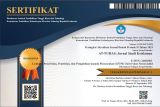Pergaulan dalam Pertunangan dan Khalwat fi Ma’na al-Haml: Studi Budaya Pertunangan di Daerah Madura
Authors (s)
(1) * Abdur Rakib
 (UIN Ar-Raniry, Banda Aceh)
(UIN Ar-Raniry, Banda Aceh) Indonesia
(*) Corresponding Author
AbstractThis research basically is to find the position of ‘urf as one of the theories that can provide legal changes in an authoritative-inclusive way to fiqh in the word khalwat in the definitive aspects of syar'iyyah in relation to culture of riding with fiancees in the Madura area. As an external consideration in cultural studies, ‘urf is one of the continuous theories with the discussion of adat to determine law in an authoritative-inclusive manner. In this study using a type of field research (field research) because it involves empirical data that views law as a set of behaviors, actions, and reality. In addition, also library research (library research) to obtain data about a norm while reviewing theories with a qualitative approach because it cannot be obtained by mathematical or numerical statistical procedures, so that it can contain about people's lives (culture), history, ethics, social movements , or family system. From the process of analyzing the meaning of khalwat using the theory of ma'na al-haml with the consideration of 'urf in which there are several elements of maslahat, this study concludes that' urf can change the position of Islamic law by combining consideration of several conditions through the process of changing meaning used in redefining the word khalwat. So as to enable culture to be engaged during the engagement period as happened in the Sumenep and Madura communities in general as a consideration of ‘valid urf.
Keywords: Relationship in Engagement, ‘Urf, and Madura. |
Full Text: PDF
Refbacks
- There are currently no refbacks.
Copyright (c) 2019 Abdur Rakib
This journal is licensed under a
Creative Commons Attribution-ShareAlike 4.0 International License





.png)






